#pluralism
Text
It’s solar and wind and tidal and geothermal and hydropower.
It’s plant-based diets and regenerative livestock farming and insect protein and lab-grown meat.
It’s electric cars and reliable public transit and decreasing how far and how often we travel.
It’s growing your own vegetables and community gardens and vertical farms and supporting local producers.
It’s rewilding the countryside and greening cities.
It’s getting people active and improving disabled access.
It’s making your own clothes and buying or swapping sustainable stuff with your neighbours.
It’s the right to repair and reducing consumption in the first place.
It’s greater land rights for the commons and indigenous peoples and creating protected areas.
It’s radical, drastic change and community consensus.
It’s labour rights and less work.
It’s science and arts.
It’s theoretical academic thought and concrete practical action.
It’s signing petitions and campaigning and protesting and civil disobedience.
It’s sailboats and zeppelins.
It’s the speculative and the possible.
It’s raising living standards and curbing consumerism.
It’s global and local.
It’s me and you.
Climate solutions look different for everyone, and we all have something to offer.
#solarpunk#hopepunk#tidalpunk#cottagepunk#bright future#climate justice#environmentalism#optimism#social justice#community#solutions#pluralism#I know stuff like EVs and vertical farms get a bad rep#they are certainly overhyped and slight techbro solutions#but I think all avenues are worth exploring even if inevitably some will be less efficacious and just than others#sorry for the long tags lol
35K notes
·
View notes
Text
monoconscious culture is reblogging something for another alter because you know theyd reblog it if they were fronting
#totally not referring to Ghostie nooo totessss#monoconscious#monoconscious culture is#actually plural#plural community#plural system#pluralism#plurality
80 notes
·
View notes
Text
The wonderful thing about pluralism is that it allows you to see the truth that has been disputed, hidden, hated, and fought for so much of the history of Christianity.
Just as God loves and has a mighty use for all of his children, he similarly loves and has mighty uses for all of his Christians.
I was raised in the evangelical Baptist tradition, and there is truth in a church of equals where the gospel is discussed plainly. There is also beauty in Catholic and Orthodox art, and God can be a mighty muse. Every tradition of Christianity has its wonderful beauty.
Every faith has its divine-inspired beauty. I adore the sound of the Shofar and the Azzan, the serenity and peace of Buddhist temples, and the wonderful cornucopia of ways that people worship God in their own way, in whichever of God's faces they praise.
24 notes
·
View notes
Text
“Cultural pluralism and multilingualism are the planetary norm. We seek the balance between cosmopolitan pluralism and deep local consciousness. We are asking how the whole human race can regain self-determination in place after centuries of having been disenfranchised by hierarchy and/or centralized power. Do not confuse this exercise with "nationalism", which is exactly the opposite, the impostor, the puppet of the State, the grinning ghost of the lost community.”
—Gary Snyder, The Practice of the Wild.
#cultural pluralism#culture#pluralism#community#state#hierarchy#nationalism#power#decentralisation#local#localisation#localism
23 notes
·
View notes
Text
The never-ending cycle of finally accepting that you’re a system only to question and think you are faking all within a few hours.
#median system#mediple system#osdd system#osddid#plural system#pluralism#plurality#internal family systems#osdd#questioning system
11 notes
·
View notes
Text
“In every church there are many very honourable men, who worship God with justice and loving kindness,’ he reminded Burgh, ‘for we know many men of this kind among the Lutherans, the Reformed, the Mennonites, and the Enthusiasts. So you ought to concede that holiness of life is not peculiar to the Roman Catholic Church, but is common to all.” - Spinoza in Spinoza’s Religion, by Clare Carlisle
#progressive christianity#christian#quaker#quakerism#progressive christian#spinoza#pluralism#religious pluralism#universalism
37 notes
·
View notes
Photo

Democratic nations in particular place great value on the principle of tolerance, especially the tolerance of religious expression. The US Bill of Rights guarantees citizens the right to free exercise of religion.
Unfortunately, some people take the notion of equal toleration of religious expression to mean that all religions are equally true, thus equally valid paths to God. In effect, democracy has been applied to ultimate truth. This seemingly “politically correct” approach to religion, though popular, represents deeply convoluted thinking.
The acceptance of social pluralism (tolerance of diverse religious expression) does not logically imply the truth of metaphysical pluralism (that all religious truth-claims are equally valid and simultaneously true).
Careful examination of the basic tenants of the various religious traditions demonstrates that, far from teaching the same thing, the major religions have radically different perspectives on the religious ultimate. [Harold A. Netland]
Christianity affirms that redemption in Christ for the believer involves an eternal personal relationship with God in the afterlife. Hinduism, on the other hand, affirms a cycle of rebirths leading ultimately to the absorption of one’s individual consciousness into God or ultimate reality. Those two visions of future reality are simply irreconcilable.
Therefore, it is highly misleading to speak as if all religions share a common soteriological good and simply differ on the means to reach it; leading to a growing consensus that it is seriously misleading to regard the various religious traditions of the world as variations on a single theme. [Harold A. Netland; Alister E. McGrath]
Homogenizing religions is a costly price to pay to eliminate religious diversity, for in the end, the religions must sacrifice the very features that make them unique and appealing in the first place; meaning, “all religions are NOT basically the same… for as soon as [the notion of sameness] moves beyond vague generalities—every religion has some version of the Golden Rule—if founders on the fact that the religions differ in what they consider essential and nonnegotiable.” [Huston Smith]
Therefore, formal laws of logic firmly demonstrate the impossibility that all religious truth claims can be true at the same time and in the same way (the law of non-contradiction: A cannot equal A and non-A). For example, Jesus Christ cannot both be God incarnate (Christianity) and not be God incarnate (Judaism, Islam) at the same time.
To reiterate, contradictory religious claims have opposite truth value, meaning that they negate or deny each other. Therefore exactly one is true and the other false. And, accordingly, Jesus Christ must either be God incarnate or not be God incarnate; no middle position is possible (the law of excluded middle: either A or non-A).
Since Jews, Christians, and Muslims all conceive the identity of Jesus of Nazareth differently (human teacher, thus blasphemer; God-incarnate; human prophet), logically speaking, their conceptions simply can’t all be true. While it is logically possible that all three positions are false, they definitely cannot all be true. Thus, the claims of popular religious pluralism fail to comport with the self-evident laws of thought, confirming that;
“Anyone who would become a pluralist must first abandon the very principles of logic that make all significant thought, action, and communication possible.” [Ronald H. Nash]
In essence, to divorce oneself from the self-evident laws of thought when it comes to ultimate reality is to resign oneself to irrationality; a price too great for most people to pay because it requires the, “forfeiture of the possibility of meaningful affirmation or statement about anything at all––including statements about the religious ultimate.” [Harold A. Netland]
~ Samples, Kenneth Richard. ‘Without a Doubt: Answering the 20 Toughest Faith Questions
15 notes
·
View notes
Quote
In the realm of culture, the new totalitarianism manifests itself precisely in a harmonizing pluralism, where the most contradictory works and truths peacefully coexist in indifference. Prior to the advent of this cultural reconciliation, literature and art were essentially alienation, sustaining and protecting the contradiction — the unhappy consciousness of the divided world, the defeated possibilities, the hopes unfulfilled, and the promises betrayed. They were a rational, cognitive force, revealing a dimension of man and nature which was repressed and repelled in reality.
Herbert Marcuse, One-Dimensional Man
#philosophy#quotes#Herbert Marcuse#One Dimensional Man#culture#literature#art#pluralism#indifference#values#politics
99 notes
·
View notes
Text
By: Matt Johnson
Published: Jan 27, 2023
“Christopher Hitchens: From socialist to neocon.” It was an irresistible headline because it’s a story that has been told over and over again. The novelist Julian Barnes called this phenomenon the “ritual shuffle to the right.” Richard Seymour, who wrote a book-length attack on Hitchens, says his subject belongs to a “recognisable type: a left-wing defector with a soft spot for empire.” By presenting Hitchens as a tedious archetype, hobbling away from radicalism and toward some inevitable reactionary terminus, his opponents didn’t have to contend with his arguments or confront the potentially destabilizing fact that some of his principles called their own into question.
Hitchens, who died in 2011, didn’t make it easy on the apostate hunters. To many, he was a “coarser version of [conservative commentator] Norman Podhoretz” when he talked about Iraq, and a radical humanist truth-teller when he went on Fox News to lambaste the Christian right: “If you gave Falwell an enema,” he told Sean Hannity the day after Jerry Falwell’s death, “he could be buried in a matchbox.” Then he gave Islam the same treatment, and he was suddenly a drooling neocon again. He defied easy categorization: a socialist who spurned ideology, an internationalist who became a patriot, a man of the left who was reviled by the left.
The left isn’t a single amorphous entity—it’s a vast constellation of (often conflicting) ideas and principles. Hitchens’s style of left-wing radicalism is now out of fashion, but it has a long and venerable history: George Orwell’s unwavering opposition to totalitarianism and censorship, Bayard Rustin’s advocacy for universal civil rights without appealing to tribalism and identity politics, the post-communist anti-totalitarianism that emerged on the European left in the second half of the twentieth century.
Hitchens described himself as a “First Amendment absolutist,” an echo of historic left-wing struggles for free expression—from Eugene V. Debs’s assertion of his right to dissent during World War I to the Berkeley Free Speech Movement. Hitchens argued that unfettered free speech and inquiry would always make civil society stronger. When he wrote the introduction to his collection of essays For the Sake of Argument in 1993, he had a specific left-wing tradition in mind: the left of Orwell and Victor Serge and C.L.R. James, which simultaneously opposed Stalinism, fascism, and imperialism in the twentieth century, and which stood for “individual and collective emancipation, self-determination and internationalism.”
Hitchens’ most fundamental political and moral conviction was universalism. He loathed nationalism and argued that the international system should be built around a “common standard for justice and ethics”—a standard that should apply to Henry Kissinger just as it should apply to Slobodan Milošević and Saddam Hussein. He believed in the concept of global citizenship, which is why he firmly supported international institutions like the European Union. He didn’t just despise religion because he regarded it as a form of totalitarianism—he also recognized that it’s an infinitely replenishable wellspring of tribal hatred.
He also opposed identity politics, because he didn’t think our social and civic lives should be reduced to rigid categories based on melanin, X chromosomes, and sexuality. He recognized that the Enlightenment values of individual rights, freedom of expression and conscience, humanism, pluralism, and democracy are universal—they provide the most stable, just, and rational foundation for any civil society, whether they’re observed in America or Europe or Iraq.
And yes, he argued that these values are for export. Hitchens believed in universal human rights. This is why, at a time when his comrades were still manning the barricades against the “imperial” West after the Cold War, he argued that the North Atlantic Treaty Organization should intervene to stop a genocidal assault on Bosnia. It’s why he argued that American power could be used to defend human rights and promote democracy. As many on the Western left built their politics around incessant condemnations of their own societies as racist, exploitative, oligarchic, and imperialistic, Hitchens recognized the difference between self-criticism and self-flagellation.
-
One of the reasons Orwell accumulated many left-wing enemies in his time was the fact that his criticisms of his own “side” were grounded in authentic left-wing principles. When he argued that many socialists had no connection to or understanding of the actual working class in Britain, the observation stung because it was true. Orwell’s arguments continue to sting today. In his 1945 essay “Notes on Nationalism,” he criticized the left-wing intellectuals who enjoy “seeing their own country humiliated” and “follow the principle that any faction backed by Britain must be in the wrong.” Among some of these intellectuals, Orwell wrote: “One finds that they do not by any means express impartial disapproval but are directed almost entirely against Britain and the United States. Moreover they do not as a rule condemn violence as such, but only violence used in defense of the Western countries.”
Hitchens observed that many on today’s left are motivated by the same principle: “Nothing will make us fight against an evil if that fight forces us to go to the same corner as our own government.” This is a predictable manifestation of what the American political theorist Michael Walzer calls the “default position” of the left: a purportedly “anti-imperialist and anti-militarist” position inclined toward the view that “everything that goes wrong in the world is America’s fault.”
Indeed, the tendency to ignore and rationalize even the most egregious violence and authoritarianism abroad in favor of an obsessive emphasis on the crimes and blunders of Western governments has become a reflex. Much of the left has been captured by a strange mix of sectarian and authoritarian impulses: a myopic emphasis on identitarianism and group rights over the individual; an orientation toward subjectivity and tribalism over objectivity and universalism; and demands for political orthodoxy enforced by repressive tactics like the suppression of speech.
These left-wing pathologies are particularly corrosive today because they give right-wing nationalists and populists on both sides of the Atlantic—whose rise over the past several years has been characterized by hostility to democratic norms and institutions, rampant xenophobia, and other forms of illiberalism—an opportunity to claim that those who oppose them are the true authoritarians. Hitchens was prescient about the ascendance of right-wing populism in the West, from the emergence of demagogues who exploit cultural grievances and racial resentments to the bitter parochialism of “America First” nationalism. He understood that the left could only defeat these noxious political forces by rediscovering its best traditions: support for free expression, pluralism, and universalism—the values of the Enlightenment.
Hitchens closes his book Why Orwell Matters with the following observation: “What he [Orwell] illustrates, by his commitment to language as the partner of truth, is that ‘views’ do not really count; that it matters not what you think, but how you think; and that politics are relatively unimportant, while principles have a way of enduring, as do the few irreducible individuals who maintain allegiance to them.” Despite the pervasive idea that Hitchens exchanged one set of convictions for another by the end of his life, his commitment to his core principles never wavered. They are principles that today’s left must rediscover.
Matt Johnson is a journalist and the author of the forthcoming book, How Hitchens Can Save the Left: Rediscovering Fearless Liberalism in an Age of Counter-Enlightenment, from which this piece is excerpted.
#Matt Johnson#How Hitchens Can Save the Left#liberalism#liberal ethics#universalism#pluralism#freedom of speech#freedom of expression#free speech#first amendment#identity politics#identarianism#woke authoritarianism#authoritarianism#tribalism#religion is a mental illness
22 notes
·
View notes
Text
Theories on the Philosophy of Power
The philosophy of power encompasses various theories that seek to understand the nature, sources, and implications of power in human societies. Here are some key theories in the philosophy of power:
Pluralist Theory: Pluralist theory posits that power is dispersed among multiple groups and individuals in society, and no single entity holds absolute power. According to this view, power is decentralized, and different groups compete for influence through political, economic, and social channels.
Elite Theory: Elite theory contends that power is concentrated in the hands of a small elite group within society, such as political leaders, business magnates, or cultural elites. According to this perspective, elites wield disproportionate influence over political decisions and societal outcomes, often at the expense of the broader population.
Marxist Theory: Marxist theory emphasizes the role of economic power in shaping society and maintains that power relations are fundamentally determined by class dynamics. According to Marxists, the bourgeoisie (owners of capital) hold power over the proletariat (working class) through the control of economic resources, leading to exploitation and inequality.
Foucauldian Theory: Drawing from the work of Michel Foucault, Foucauldian theory examines power as a diffuse and pervasive force that operates through disciplinary mechanisms and social institutions. Power is not solely held by individuals or groups but is embedded in societal structures and practices, shaping norms, behaviors, and subjectivities.
Feminist Theory: Feminist theories of power highlight the gendered dimensions of power relations and critique patriarchal structures that perpetuate male dominance and female subordination. Feminist scholars analyze how power operates within families, workplaces, and political systems, and advocate for gender equality and social justice.
Poststructuralist Theory: Poststructuralist theorists, such as Jacques Derrida and Judith Butler, challenge essentialist notions of power and instead focus on power as performative and discursive. Power is understood as fluid and contingent, constructed through language, discourse, and social practices, rather than being inherent or fixed.
Network Theory: Network theory conceptualizes power as emerging from relational connections and interactions between actors within complex networks. Power is distributed unevenly across network structures, with some nodes or actors exerting greater influence due to their centrality, connectivity, or resource control.
Rational Choice Theory: Rational choice theory models individual behavior as driven by rational calculations of costs and benefits, including the pursuit of power. According to this approach, individuals seek to maximize their utility or achieve their goals by strategically deploying resources and forming alliances to enhance their power position.
Critical Theory: Critical theories of power, influenced by the Frankfurt School and critical social theory, emphasize the role of ideology, culture, and social institutions in perpetuating power inequalities. Critical theorists analyze how power operates through processes of domination, hegemony, and ideological control, and advocate for emancipatory social change.
Intersectional Theory: Intersectional theory considers how power operates at the intersections of multiple axes of identity, including race, gender, class, sexuality, and ability. This approach recognizes that power relations are shaped by intersecting systems of oppression and privilege, and emphasizes the importance of addressing multiple forms of inequality simultaneously.
These theories offer diverse perspectives on the nature and dynamics of power, illuminating its complexities and providing insights into its effects on individuals, groups, and societies.
#philosophy#epistemology#knowledge#learning#chatgpt#education#metaphysics#ethics#psychology#Pluralism#Elite theory#Marxism#Foucault#Feminism#Poststructuralism#Network theory#Rational choice theory#Critical theory#Intersectionality#power#culture#society#sociology#theory
8 notes
·
View notes
Text
So I... I guess that Bruce Wayne is canonically plural...? But like... They decided to go about it in one of the worst ways possible...?
So uh... Listen to this. At some point Bruce purposefully decided to create a "backup personality" named Zur-En-Arrh in case he got brainwashed or mind controlled or something. And since you know... Stuff like tulpas and people who purposefully try to make alters is a thing that exist/happens like... I guess that counts as a case of canonical plurality...? (Albeit, not in the same way as DID.)
But hey! Look at that! Guess what!? Zur-En-Arrh is an evil alternate personality that wants to get Bruce to kill people and wants to take over as a more violent Batman! And so Bruce is trying to get rid of/seal away Zur-En-Arrh as best he can!
Like... Maybe I'm off base. Maybe what I've seen from the current arc in Batman is better and more nuanced than what I've been seeing... But like... This is very much Not a Good Look...? Like... People who are keeping up with the current arc of Batman and systems that might be reading this... Do you think that I'm wrong is seeing it like this...? This is like... Pretty bad, am I right...? I just want to know if I'm accurate in this assessment... Because like... Seeing how they're doing this and comparing it to what's going on in Gotham Nocturne has been... A time.
25 notes
·
View notes
Note
Monoconscience culture is switching between I/me, we/us, AND third person pronouns when talking about something your headmate did that you actually had little to no involvement in.
#anonymous#monoconscious#monoconscious culture is#actually plural#plural community#plural system#pluralism#plurality
47 notes
·
View notes
Text
What is My Pluralistic Stance on Human Sacrifice/Murder? (Caution Spicy)
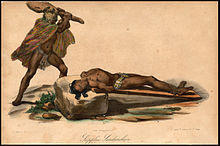
First, I must start by saying: I don’t think human sacrifice was justifiable in any time period, race, culture, or geographical location. I can’t imagine that’s an acceptable way to appease the gods. But in the same breath, I can also be aware that that is my perception of the Divine, gods, and powers that be. Any interpretation I muster will be my subjective interpretation of the symbols and images cast before us by the gods and, ultimately, The One.
If someone today were to think human sacrifices were still acceptable, who am I to say they are wrong and then go out to enforce my perception of what people should be doing? I am not in law enforcement, this is why we have people that do that in society, to go after murders. This is why I’m also drawn to both (Neo) Platonism and Daoism. It allows me to have and establish my morals but also allows me to flesh out my pre-existing pluralistic beliefs. I'm being taught to not make distinctions between what “is” and what “isn’t” and to let Fate naturally distinguish itself.
Zhuangzi says this: "The Dao has no boundaries. Words have never had constancy. It is because of "it is" that boundaries exist (2.14.1-3). Guo Xiang expands on the last sentence: It is because the Dao has no boundaries that each of the myriad things can fully realize the limits to its own potential.
Regarding punishment and the enforcement of things like murder, I take a very deterministic stance that if it is not in accord with Fate or Nature…whatever we are doing, Nature/Fate, or the Law of the Land will correct it, sometimes in the most brutal and disgusting ways. But we have grown as a society where murder and human sacrifice are unacceptable.
I don’t think pluralism gives the murders any “legitimacy.” I think pluralism allows for more of an understanding of all the bad stuff we do to each other and the world and to try to find the next best solution to correct our mistakes. That said, I’m also being taught/reminded that our knowledge does have limits, and that in turn means so does our understanding of things, be they bad or good.
So how can I "understand" the murder while also believing full-heartedly that their actions are completely unjust and should meet some sort of punishment? Zhuangzi says this: To know how Heaven acts and how man acts is to reach perfection. To know how Heaven acts is to live in step with Heaven. When it comes to knowing how man should act, he takes what his knowing knows and uses it to know what he does not know and so lives out the full span of his years without dying young in mid-course; such is his fullness of knowledge. (6.1.1-3)
I take the above quotes to mean spontaneously having morals but not too self-consciously pondering or enforcing them. To know how Heaven and Man act is to act in accordance with our innate principle, which is always in step with Heaven, if we cast aside the notion of "what is" and "what is not" (Zhuangzi 2.14.11).
And a friend in Discord raised a good point: how much understanding can we give until we give that bad or good thing a platform? The answer will vary for everyone, as I don't wish to dictate how much "understanding" or "knowledge" one should have. According to the words of Zhuangzi and Guo Xiang, we are allotted a certain amount of understanding or knowledge. This doesn't mean it's futile to study or try to gain understanding or knowledge, but it's to recognize your own limits. If Law enforcement and politics are in one's innate nature, then one should most definitely pursue that. For me, I know that's not in my nature. We are encouraged to have "fullness of knowledge," but this is not as good as completely discarding knowledge entirely and leaving it up to Heaven to naturally divide and distinguish. (Zhuangzi 6.2.1). The act of "not knowing" and "knowing" results in a sort of wholeness that our knowledge nourishes what we "don't know," according to Guo Xiang comments on 6.2.1.
We "don't know" why people thought human sacrifice was okay and justifiable. Today, we "don't know" why people murder and why some people have a greater understanding of why the murderer murders. So for each of us, we use what we know to furnish what we "don't know." This is why so many of us have different answers for this spicy topic: Murder and Human sacrifice.
I was explaining a little bit of what I’ve been reading on Daoism to my father, and he’s skeptical too of how “loose” and lacking the ethics are. But that’s a wrong takeaway from what I was saying and pluralism in general. Daoism calls us to act spontaneously when we know something in our innate principle (nature) to be wrong. If we are perfectly aligned with Fate, in harmony with it, we can act in accord with what naturally is and isn’t good for the world. But first, we must cast aside the very notion that things are and that they are not. It’s very similar to Hermeticism in that respect, as in we must cast aside the physical world and all its illusions to truly find the images of God(The One).
18 notes
·
View notes
Text
If there's one good thing about Britain it's the diversity of its pagan past more than anything, and the fact that there's still so much to be found and rediscovered. Before Christianity, the land was home to countless pagan gods from numerous different cultural backgrounds. This includes not only Celtic, Brythonic, or later Anglo-Saxon gods, but also Roman gods and the gods of any number of foreign cults that came to Britain during the Roman era, as well as the Norse gods who were still worshipped by Vikings some time after Britain became Christian.
I guess the main virtue of that is that any number of gods have a place here.
#britain#british paganism#roman polytheism#norse polytheism#anglo-saxon polytheism#celtic polytheism#brythonic polytheism#paganism#pluralism
39 notes
·
View notes
Text
Question for systems from a questioning system!
When you are blurry, what does it mean? Do you the current person who is aware and currently conscious, do you feel off about yourself, which causes the blurriness?
Whenever | feel dissociated, I feel my identity (who l am currently) is foreign to me, like I'm here but not here, like I'm me but not me. It kinda feels like someone else is with me, but idk if that is what being blurry means.
#pluralism#plural system#plurality#osddid#osdd system#osdd#mediple system#median system#internal family systems
7 notes
·
View notes
Text
"A cornation reflecting multi-faith Britain"
Charles Defender of ALL Faiths

The unprecedented joint declaration from other religious leaders reads: "Your Majesty, as neighbours in faith, we acknowledge the value of public service. We unite with people of all faiths and beliefs in thanksgiving, and in service with you for the common good."
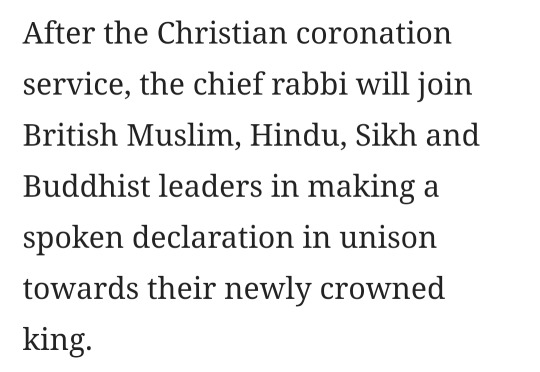


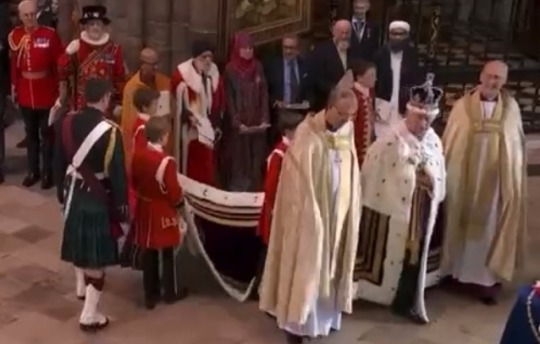
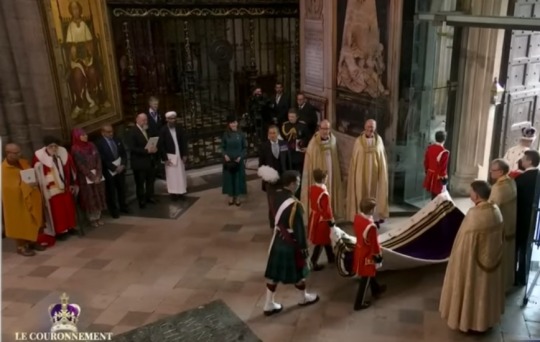
Something that would never occur in a mosque or temple:
After the Christian coronation service, the chief rabbi will join British Muslim, Hindu, Sikh and Buddhist leaders in making a spoken declaration in unison towards their newly crowned king.
"It will be quite brief, but exceptionally powerful," Mirvis said, while stressing that he was not required to speak into an electronic microphone in the abbey, again to respect the Jewish holy day.
@hunnymae @honeytothebee
@sandiedog3 @skippyv20 @lovelycariad
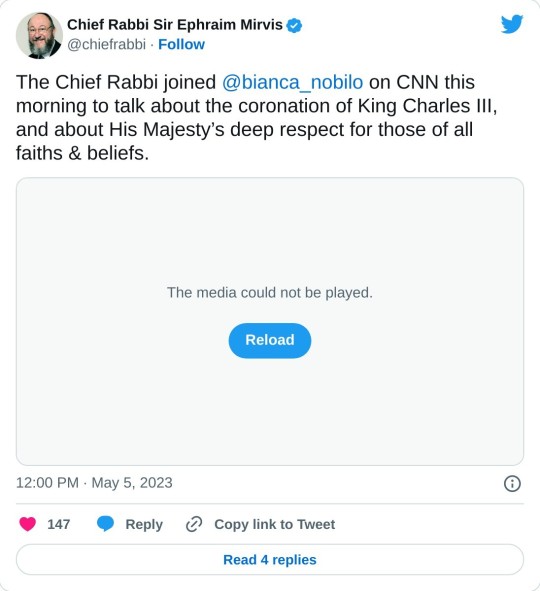
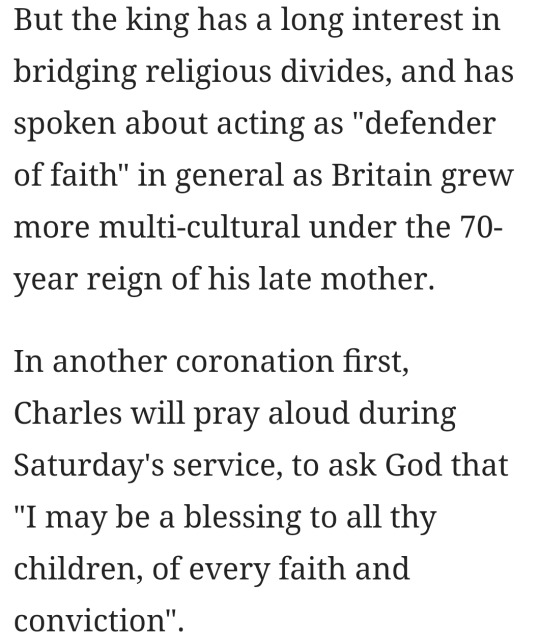
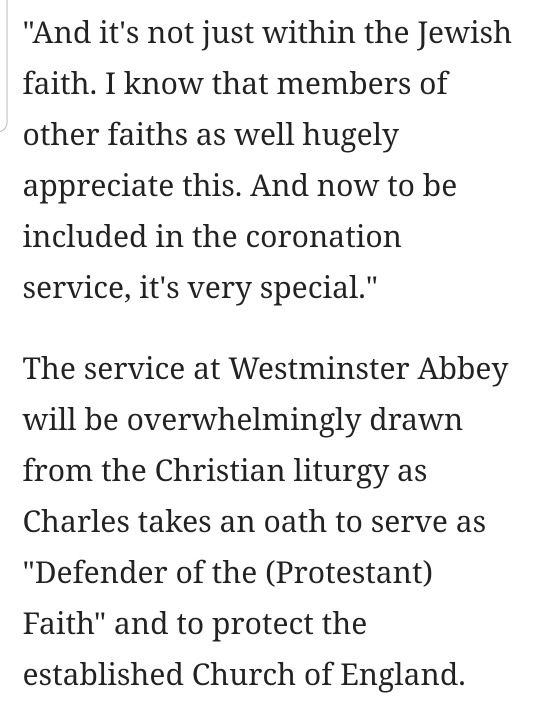
"And it's not just within the Jewish faith. I know that members of other faiths as well hugely appreciate this. And now to be included in the coronation service, it's very special."
The service at Westminster Abbey will be overwhelmingly drawn from the Christian liturgy as Charles takes an oath to serve as "Defender of the (Protestant) Faith" and to protect the established Church of England.

#pluralism#marxism#brf#pluralism and diversity#defender of all faiths#wef#world economic forum#klaus schwab
23 notes
·
View notes